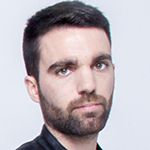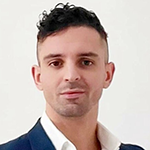Richter’s transformation (RT) is a rare condition in patients with chronic lymphocytic leukemia (CLL) which transforms into a much more aggressive form of B cell lymphoma, conferring a poor prognosis. The mechanisms and molecular changes that drive RT remain largely unknown. In this webinar, the featured speaker, Dr. Ferran Nadeu, will discuss their research study recently published in Nature Medicine where they applied single-cell DNA sequencing (scDNA-seq) to resolve clonal heterogeneity and detect rare pre-existing mutations associated with disease transformation.
To identify the genetic driver mutations and evolutionary histories over the disease course, Dr. Nadeu’s lab first sequenced the whole genome of 54 longitudinal samples covering up to 19 years of disease course in 19 cases of CLL developing RT. They then performed single-cell DNA sequencing using the Tapestri Platform and the 32-gene CLL Catalog Panel from Mission Bio on 16 longitudinal samples of four cases to validate these evolutionary histories of RT, and to track early driver mutations over the disease course.
The speaker will discuss how single-cell DNA sequencing allowed high-sensitivity detection of driver mutations that bulk next-generation sequencing didn’t call, identifying minute subclones at the time of CLL diagnosis which were dormant for six to 19 years until rapid expansion at transformation. He will also overview the findings from the study that suggest that CLL evolution to RT is driven by pre-existing subclones generated before diagnosis and that early intervention to eradicate the dormant RT subclones may prevent the future development of this lethal complication of CLL, uncovering potential therapeutic targets for RT.
Register to learn about unraveling clonal heterogeneity & progression to Richter’s transformation in chronic lymphocytic leukemia with single-cell DNA sequencing.
Speakers

Ferran Nadeu, Postdoctoral Researcher, Institut d’Investigacions Biomèdiques August Pi i Sunyer (IDIBAPS), Barcelona, Spain
Ferran Nadeu, PhD graduated from the University of Barcelona in 2013 and went on to receive his MSc in bioinformatics for health sciences from Pompeu Fabra University in 2015, and PhD in biomedicine from the University of Barcelona in 2020. Dr. Nadeu is currently a postdoctoral researcher in the lab of Elías Campo, MD, PhD at the Institut d’Investigacions Biomèdiques August Pi i Sunyer (IDIBAPS) in Barcelona, Spain. His research focuses on the molecular pathology of chronic lymphocytic leukemia (CLL) and lymphomas.

Simone Formisano, Technical Application Liaison, Mission Bio
Simone Formisano is Technical Application Liaison at Mission Bio. He obtained his Master’s Degree in Biotechnology at Columbia University, New York City (United States). Before joining Mission Bio in 2022, Simone completed his Doctorate experimental work in cancer immunotherapy at Ludwig Maximilian University of Munich. Afterward, he contributed to the clinical development of several therapies in solid oncology by joining Daiichi Sankyo as a Medical Science Liaison.
Who Should Attend?
Researchers, Scientists, Principal Investigators, Directors and VPs of R&D and Lab Managers focused on:
- Hematologic Malignancy Research
- Precision Medicine
- Drug Discovery
What You Will Learn
Attendees will:
- Get an overview of the findings from a study that reconstructed the evolutionary history of Richter’s transformation and revealed the molecular processes underlying the disease transformation
- Learn how single-cell DNA sequencing can unravel clonal heterogeneity by identifying co-occurrence and zygosity of mutations, CNV, or LOH events and by detecting rare clinically relevant subclones that identify what is happening in the tumor
- Discover the science behind a single-cell multi-omics platform, including the unique two-step droplet workflow, data analysis and panel design
Xtalks Partner
Mission Bio
Mission Bio is a life sciences company that accelerates discoveries and cures in oncology by equipping researchers with the ability to measure multi-omics at single-cell resolution. The company’s Tapestri Platform gives researchers worldwide the power to interrogate every molecule in a cell together, providing a comprehensive understanding of activity from a single sample. Mission Bio’s multi-omics approach improves time-to-market for new therapeutics, including innovative cell and gene therapies that provide new pathways to health. Partnering with pharma and biopharma companies, Mission Bio implements proven single-cell multi-omics capabilities into discovery, translational, and clinical research efforts. Founded in 2014, Mission Bio has secured investment from Novo Growth, Cota Capital, Agilent Technologies, Mayfield Fund, and others.
You Must Login To Register for this Free Webinar
Already have an account? LOGIN HERE. If you don’t have an account you need to create a free account.
Create Account

